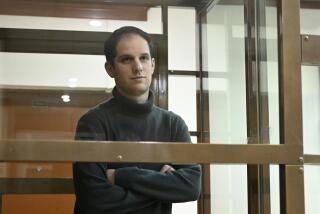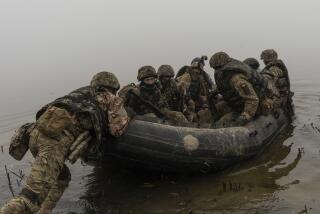Both Sides Silent as Shultz, Gromyko End Arms Talks
- Share via
GENEVA — The United States and the Soviet Union ended two rounds of talks today with no immediate word on whether they had agreed to resume arms control negotiations.
Secretary of State George P. Shultz met with Soviet Foreign Minister Andrei A. Gromyko for 7 hours and 42 minutes in an effort to break the 13-month stalemate.
Shultz returned to his hotel and gave no sign to waiting reporters on whether he had succeeded.
Earlier, during a break in the afternoon session, he telephoned a report to President Reagan, a U.S. official said.
There were some indications that there might be a briefing on the talks, but no definite word. A huge salon in a hotel was reserved on the expectation that Shultz would hold a news conference at the end of the day.
Today’s first round, lasting nearly 2 1/2 hours, was held at the Soviet mission. The second session was at the U.S. mission and ended at 7:50 p.m. (10:50 a.m. PST).
Neither the U.S. nor Soviet government lifted the veil of secrecy that has kept the substance of the discussions from the public.
A reporter who tried to pry some information from Gromyko at a picture-taking session was turned aside by the 75-year-old foreign minister.
“I confirm that I am Gromyko,” Gromyko said.
And when the reporter persisted in asking if post-Geneva negotiations had been set, Anatoly F. Dobrynin, the Soviet ambassador to Washington, responded: “Good question.”
The American side was also closemouthed. State Department spokesman Bernard Kalb held no briefings for reporters, apparently on Shultz’s orders.
CBS News anchorman Dan Rather reported from Geneva this morning that CBS had learned that Shultz went into today’s sessions with “new information and new instructions” from President Reagan.
Rather reported that Reagan gave Shultz the new instructions after Shultz called him and said the Soviets were pressing for more details on U.S. proposals.
Asked to comment on the CBS report today, a White House spokesman said there had been no change in Shultz’s instructions from the President.
The chill that developed between the two countries during the Reagan Administration’s first term appeared to be yielding to cordiality and conciliation after 6 1/2 hours of talks between the two men on Monday.
Dropping their usual reserve, Shultz and Gromyko were almost playful in posing for pictures Monday, while a mutually agreed-on news blackout hinted that they could be at a critical point in trying to set up future arms talks beyond the two-day session in Geneva.
Apart from the arms control issues--both nuclear arsenals and space weapons--the two governments may be approaching an agreement on a joint space venture.
The idea, which already has the endorsement of Reagan and Robert C. McFarlane, his national security adviser, has gained “new currency,” said a U.S. official who spoke on condition of anonymity.
More to Read
Sign up for Essential California
The most important California stories and recommendations in your inbox every morning.
You may occasionally receive promotional content from the Los Angeles Times.










